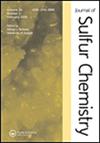Synthesis of symmetric diaryl disulfides using odorless and easily available phenyl dimethylcarbamodithioates as organosulfur sources
IF 2.1
3区 化学
Q3 CHEMISTRY, MULTIDISCIPLINARY
引用次数: 0
Abstract
A new synthetic protocol to give a variety of symmetric diaryl disulfides from odorless and easily available phenyl dimethylcarbamodithioates was developed. By using phenyl dimethylcarbamodithioates as organosulfur source, the target products were furnished smoothly through simple hydrolysis, giving a series of symmetric diaryl disulfides. The protocol features simple operation, odorless and easily available organosulfur source and high yield.
以无臭易得的苯基二甲基氨基硫代酸酯为有机硫源合成对称二芳基二硫化物
开发了一种新的合成方案,以无臭易得的苯基二甲基氨基甲二硫代物为原料合成各种对称二芳基二硫化物。以苯基二甲基氨基二硫代酯为有机硫源,通过简单的水解反应顺利地得到目标产物,得到一系列对称的二芳基二硫化物。该方案操作简单,无臭,易得有机硫源,收率高。图形摘要
本文章由计算机程序翻译,如有差异,请以英文原文为准。
求助全文
约1分钟内获得全文
求助全文
来源期刊

Journal of Sulfur Chemistry
CHEMISTRY, MULTIDISCIPLINARY-
CiteScore
4.10
自引率
9.10%
发文量
38
审稿时长
6-12 weeks
期刊介绍:
The Journal of Sulfur Chemistry is an international journal for the dissemination of scientific results in the rapidly expanding realm of sulfur chemistry. The journal publishes high quality reviews, full papers and communications in the following areas: organic and inorganic chemistry, industrial chemistry, materials and polymer chemistry, biological chemistry and interdisciplinary studies directly related to sulfur science.
Papers outlining theoretical, physical, mechanistic or synthetic studies pertaining to sulfur chemistry are welcome. Hence the target audience is made up of academic and industrial chemists with peripheral or focused interests in sulfur chemistry. Manuscripts that truly define the aims of the journal include, but are not limited to, those that offer: a) innovative use of sulfur reagents; b) new synthetic approaches to sulfur-containing biomolecules, materials or organic and organometallic compounds; c) theoretical and physical studies that facilitate the understanding of sulfur structure, bonding or reactivity; d) catalytic, selective, synthetically useful or noteworthy transformations of sulfur containing molecules; e) industrial applications of sulfur chemistry; f) unique sulfur atom or molecule involvement in interfacial phenomena; g) descriptions of solid phase or combinatorial methods involving sulfur containing substrates. Submissions pertaining to related atoms such as selenium and tellurium are also welcome. Articles offering routine heterocycle formation through established reactions of sulfur containing substrates are outside the scope of the journal.
 求助内容:
求助内容: 应助结果提醒方式:
应助结果提醒方式:


